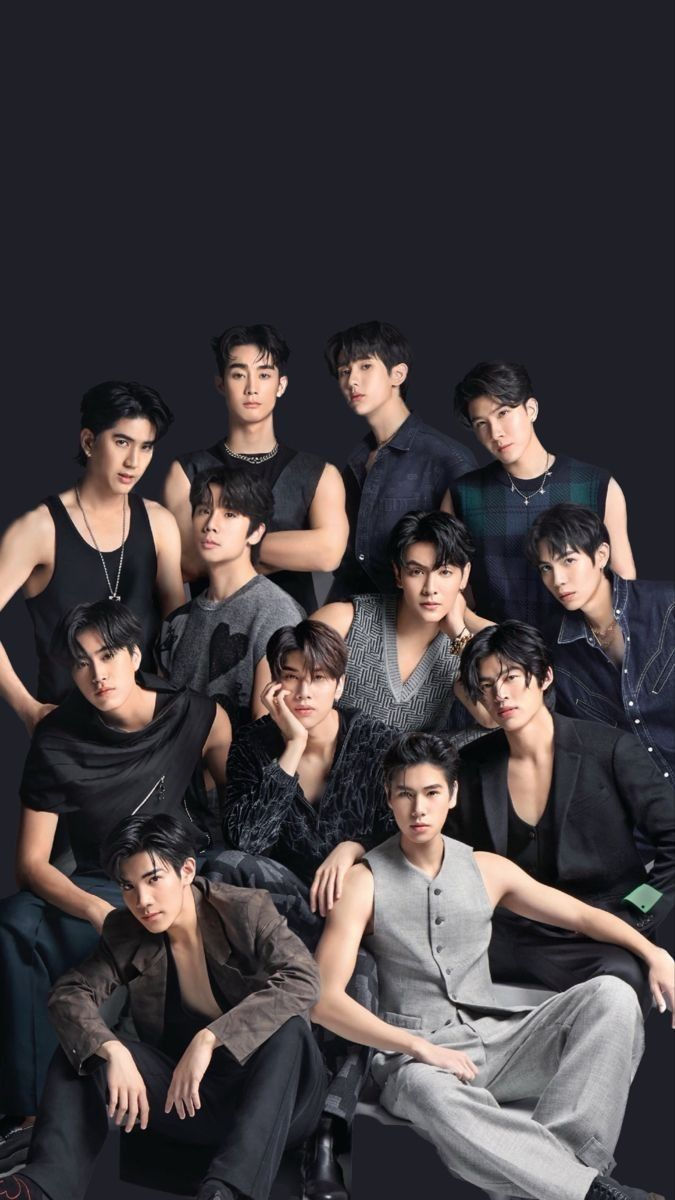Behind the BL Boom: GMMTV’s Marketing Model
- Courtney Coker
- May 15
- 9 min read

Boys In Love <3
Ohhh babyyyy, how I love Thai BLs!!
Who knew that after reading BL manhwa and manga, there was a whole other world to tap into? Obviously, many different countries give us phenomenal BL dramas, but Thailand has it down to a science. From the beautiful, fun, and funny shows they portray on screen, to the love and friendship they share off-screen, they have us BL fans wrapped around their fingers.
They’ve created a large and loyal fanbase that eats up everything we’re given—and we’re always hungry for more. Thai BLs have seemingly blown up in recent years, becoming global and getting much more recognition across Asia and around the world.
How did this occur? What are they doing that is working so well?
The Thai BL industry has been a topic I’ve been OBSESSED with because of how fascinating their industry, media, publicity, and so much more function. It is rare in this day and age to see something be built from the ground up—to witness a whole industry rise from scratch.
And that is exactly why I’m diving into it now.
If you already watch BLs, this will just be a fun deep dive into more of the industry side of things. If you don’t watch… well, maybe this will convince you—because you are definitely missing out.
Love is in The Air
From my knowledge of BLs—which, again, take at your own discretion—they’ve actually been around for quite a while. But for the longest time, they existed mostly in the form of books or comics. Like I mentioned before, the biggest players in the BL game were manhwa, manga, and danmei.
Don’t get me wrong, there were dramas here and there, but let’s be honest—the quality was rarely the best. The acting? Iffy. The storylines? Often left a lot to be desired. And the kissing scenes? Cue the infamous dead fish lip kiss. You know the one.
If you know some of those super early ones that you loved and feel were the exception, please hit me with recs—I’d genuinely love to watch. But let’s be real: those are probably the exceptions. Most of them were exactly what I described above.
There was so much potential to tap into, though—not just from all the amazing source material, but from the massive fanbase that had already formed around it. But for a long time, no one was truly tapping into that potential.
That is... until Thailand decided to bite.
Now, based on the title of this post, you can probably guess—we’re focusing mainly on the Thai BL industry. Why? Because I genuinely believe they’re the only ones who’ve cracked the code and found the perfect formula.
Now this isn’t to say that other Asian countries haven’t created amazing BLs—some absolutely have! But when it comes to building a whole industry around it, publicizing it, and actually benefiting from it? Thailand is in a league of its own.
Now a lot of what I say can obviously be argued and debated because the timeline is a little blurry about when and what caused Thai BLs to blow up so significantly. This blog is up for an open discussion, and I would love to talk about it with you so feel free to comment!
Theory Of Love
Thailand had some smaller, independent companies testing the waters with one-shot BLs. They were never super popular, but they were definitely popular enough to be noticed. And honestly, I think the love for BL reading—whether it was manhwa, manga, or danmei—didn’t go unnoticed either. It’s just that no one really knew what to do with it.
That is… until the already-established entertainment companies in Thailand decided to give it a real shot. And of course, I’m talking about GMMTV.
Now, personally, I believe that GMMTV was—and still is—the biggest BL distributor in the world. Their business model? I'm obsessed. It’s seriously fascinating how they built a formula that so many other BL companies copy. And while others have had good success, no one quite does it like GMM. Sure, the journey hasn’t been perfect—there have definitely been bumps along the way, and they’re still figuring some things out—but for the most part, their system works. And it works well.
I say all this because GMM created the first BL that actually took off in a big way. That show was 2gether, which came out in 2020 and marked the debut of the now insanely popular couple BrightWin. For many fans, this was the entry point into Thai BLs. It was also the show that told GMM everything they needed to know about the power and popularity of the genre. The momentum continued with Not Me, released in 2021 and starring another iconic couple, OffGun. Some would argue this series was even more impactful. Both shows changed the trajectory not only for GMM, but for the entire Thai entertainment industry.
Another major title worth mentioning—though not a GMM production—is I Told Sunset About You, which also dropped in 2020 and starred BillkinPP. This drama stood out for its cinematography, emotional storytelling, and overall quality, and it's often considered one of the most beautifully made BLs ever released.
So while other countries have created great BLs, it’s Thailand that has figured out how to turn this genre into something bigger than anyone expected.
Kinnporche: The BL That Took Over the World
These BLs made waves and set off a major catalyst in Thailand. Suddenly, we were flooded with more BLs—many from smaller companies, while GMMTV continued to push forward with more releases. But they were still waiting for that true global breakthrough. And that’s exactly what happened when a BL series surfaced that changed everything.
That series was Kinnporche, released in 2022. This show exploded on the scene and took the BL world by storm. Some may argue about earlier hits, but there’s no denying that before Kinnporche, the global reach of Thai BLs wasn’t quite as extensive. The series was a game changer. For the first time ever, the cast went on a global tour, bringing the magic of Thai BL to fans worldwide.
Not only did Kinnporche skyrocket BeOnCloud (the production company), but it also launched the careers of several actors, most notably Jeff Satur, who is now an international musician and singer, with millions of fans around the globe—many thanks to his role in this series. (me included thank you kinnporche for introducing me to Jeff 🙌🏼)
BOC's Missed Opportunity: What Went Wrong After Kinnporche?
Like I said before, the main company we’re focusing on is GMMTV. You might be wondering why, especially since BeOnCloud (BOC) was the one to break through globally. Well, let me tell you where I think they went wrong.
After the release of Kinnporche, BOC immediately jumped on their success by doing a world tour. On paper, it’s a great idea—capitalize on your success, make money off ticket sales, and get some good publicity for the show. But here’s the problem: they toured for almost a whole year after the success of Kinnporche. And because BOC was so small, every actor they had was part of Kinnporche, which meant every actor was touring. That inevitably led to the company not releasing any new content.
Fans of the series were likely left craving more shows, not just wanting to watch a tour. That’s where I think they messed up.
In my opinion, BOC should have capitalized on Kinnporche’s success by creating new series with some of the side couples. They could have even brought in new actors and kept the content coming while the cast was on tour. Even after the tour, they kept hinting at new series and never quite delivered. Overall, BOC has kind of dropped the ball. Sure, they’ve finally released new series, but they haven’t been as successful, and they've lost a lot of the momentum they had.
There are still loyal fans, and don’t get me wrong—4 Miniutes was amazing—but BOC left a lot to be desired. When that gap for content opened up, GMMTV stepped in and filled it.
A Tale of Thousand Stars
Now, let’s dive into GMMTV. You might have mixed feelings about this company, but personally, I love her as much as one can actually love a conglomerate. As I mentioned before, GMM had some couples prior to Kinnporche. We call them the "four pillars" of GMM. However, it wasn’t until the second generation of BL couples that a true model took place.
It all started with PondPhuwin in Fish Upon The Sky, and then we saw a wave of new couples and a whole new era of success for BLs. GMM ushered in a fresh wave of couples and immediately got to work, pushing out BL after BL. To this day, that’s what they’re known for, and it’s where a lot of their success stems from.
What’s even better than marketing a single couple? Marketing a whole company. We see this done in K-pop, with companies like SM or Hybe marketing all their groups as a "family." SM is probably the better example, with their use of the NCT Universe, where multiple sub-groups are encompassed under one overarching group. The interactions between these sub-groups are key to their success. Then, there’s the famous SMtown, where all SM groups come
together to perform, which makes fans want to get into multiple groups under one company instead of just stanning one group.
(Quick note: I'm not here to fully support K-pop companies, just pointing out how they market their stuff.)
Now, GMMTV took a similar approach. They hired actors of varying ages and focused on marketing all of the GMM actors as a “family.” And let me tell you, it works. GMM has so many fans because of how they market their talent. Just like K-pop idols, we get variety shows featuring the couples and actors together, we see them doing interviews, going on trips, holding fan signs, and even hosting concerts as a group. Yes, you read that right—GMM has their couples hold their own concerts. Some of them even have their own light sticks and representative animals!
It’s pretty amazing to see how much they’ve taken the K-pop formula and turned it into their own BL empire. Fans get the chance to “bias” a couple and purchase merch specific to them. We’re talking photobooks, photocards, keychains, plushies, and so much more. GMM really built a whole industry around this, and honestly, they were the first to market it on this level.
Now, I know we all know it’s ultimately a money grab—but I’ve got to give credit where credit’s due. They do it so well, it’s hard to ignore.
Love Mechanics
Let’s break it down a bit more, so I can share my thoughts. Since I’m from America, when it comes to actors or musicians, I don’t usually think about what company or label they’re under. I think of them as their own entity, independent of any larger force behind them. But in Asian entertainment, especially in the world of K-pop and Thai BL, companies and labels are incredibly well-known. And that’s something I find really interesting. It makes the company itself more prominent, and it allows the artist to be closely associated with that company. This connection makes you want to invest more into everything the company has to offer.
Then, we get into the marketing of the couples, which is done both on and off-screen. GMM could’ve stopped at just publicizing the couple in the show, but they take it above and beyond. For a couple to truly take off in Thailand, they have to promote themselves in their everyday lives. Whether it’s taking photos together, going on trips, posting TikToks, doing live streams, etc., GMM ensures the couple’s presence doesn’t end when the series does. And this is something that’s really interesting because you don’t often see this level of interaction in Western media.
Of course, it makes sense when you think about it: there’s an innate desire from audiences to believe that actors are close, maybe even friends, outside of the series. It taps into that basic human want, and they’ve used it to create an entire product. When people believe in your couple, they’ll watch all of your shows and buy all your merch.
And it doesn’t stop there. This concept doesn’t just apply to the couples—it extends to all the actors in GMM. Fans get invested in the relationships between all the actors, and before you know it, you’re obsessed with the whole company. You can’t really separate the talent from the company itself anymore.
What’s even more impressive is the way they cover every front. They make money not only from shows but also from fan meets and even concerts. On all levels, GMM is finding ways to maximize their profit. Whether you love or hate the idea of BL companies, it’s clear—they’ve figured out how to make it a lucrative business.
It’s not just GMMTV using this model anymore—pretty much every other BL company that’s popped up since has followed suit. And honestly, it’s fascinating to me. This marketing approach is pretty much unheard of for this type of media, and it’s honestly mind-blowing how well it works. I could probably talk about this for hours (and maybe I will in a part two, if you all want that wink wink). There’s definitely so much more to dive into that I didn’t even have time to cover, so if you're interested, I’d love to go deeper into it all!
Disclaimer: Just to clarify, when I talk about the companies and the industry, I’m discussing the business side of things as a whole, which is why I approach it the way I do. I fully recognize that, at the end of the day, we’re talking about real people, not just products. It’s important to remember that companies are often imperfect—sometimes mistreating their workers or fans. While I admire GMMTV’s business model and recognize how successful they've been, I want to make it clear that my appreciation is for their actors and the content they create, not necessarily the company itself. I don’t “love” any company, but I do love the people and the talent that make these shows special.
Thank you for reading!!!!



Comments